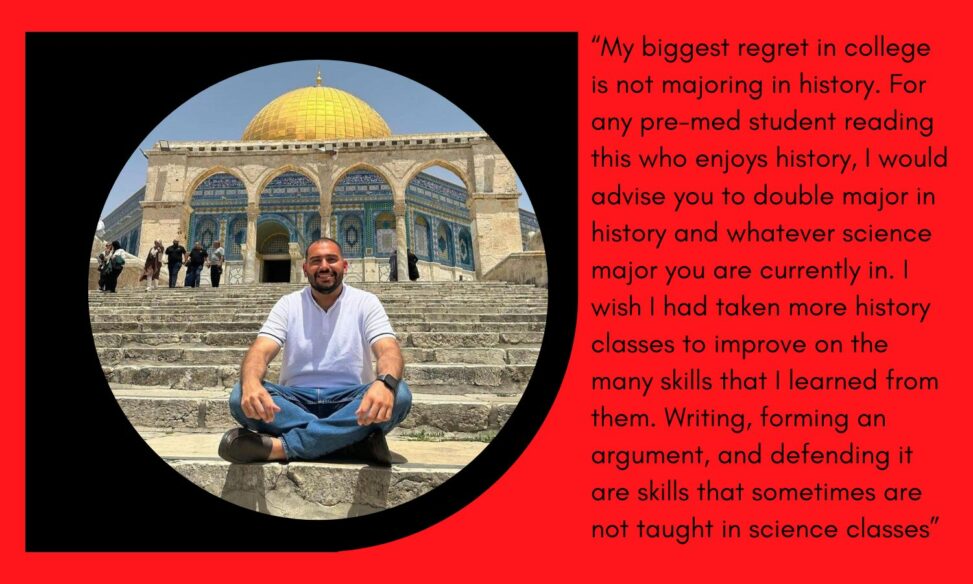I was born in Amman, Jordan, and then moved to Cincinnati for college. I attended the University of Cincinnati from 2013-2017, majoring in biology and neuroscience. I also had a minor in history. I went on to work as a lab technician for a year and a half. I then attended Ohio University for medical school. I graduated from there in 2023. During my free time, I enjoy going to the gym and playing video games. I am a big Bengals fan. I can’t wait for the day that Joe Burrow gets Cincinnati its first ring.
What are you up to these days?
I am currently a general surgery resident in Youngstown, OH. I was drawn to surgery because as a surgeon you can make a direct and immediate impact on patient’s lives in ways that other specialties cannot. I am a first-year resident, so I still have four-and-a-half years of residency. I am not sure yet if I just want to do general surgery or continue to do a fellowship in a surgical subspecialty.
What brought you to history at UC?
I took a class with Dr. Longfield Karr called ‘’Pirates, Brigands and Tyrants’’ during my spring semester of freshman year, and it completely changed the way I perceived the field of history. I have always enjoyed reading about history. I actually knew quite a bit about Middle Eastern, American, and European history. However, I thought that the field of historical studies is just that, knowing what happened on certain dates. When I attended that class, I realized what it truly means to study history. You must do research, look at primary and secondary sources, form a thesis, and then defend it, and I really enjoyed doing that.
What did you focus on as a history student at UC?
I tried taking classes with Dr. Longfield Karr because I was interested in her teaching topics. As someone who grew up in the Middle East, I was always interested in politics. When I was in college, the Arab Spring was still ongoing in the Middle East. Therefore, I was immediately drawn to the topics that she discussed in her classes. Understanding the historical context of justice, rights, and jurisprudence helped me broaden my horizons and understand why things are the way they are in the world we live in right now.
I also liked Dr. K’s style of teaching. She wants you to think critically about the topics that we discussed in class, come up with your own thesis/argument, and then be able to support it. I believe that this is how history is supposed to be taught.
Did you have any favorite history courses? Which ones and why?
My favorite class was Ruler, Rebels, & Rights. It was a great course about the Tudors and Stuarts era in England. I really enjoyed that course because it took you through the development of England into a modern state. That course helped me start to understand complex topics like Justice, Sovereignty, Tyranny and Rights.
What skills did you pick up from studying history that have served you well beyond your courses?
The most important skill is critical thinking. You can’t take anything at surface value. There are many myths in history, and if you do not go through primary and secondary sources carefully you will get tricked into believing what the authors want you to believe. This is important in medicine because patients present differently, and you must use your critical thinking skills to analyze subjective and objective information.
Being a history minor also taught me how to make an argument and be able to defend it. You must argue your thesis to whoever is reading your paper. When you are applying to medical school and residency, you must convince an admission committee to accept you into their school/program. The people on these committees have different life experiences than you. They do not know you. The only thing that will make an impression on them is your personal statement. Writing a personal statement, or even interviewing, is very similar to writing a history paper. Your thesis is ‘’I will be a great physician,’’ and being able to defend this thesis based on the facts in your application is essential to getting accepted into medical school or to match into the specialty you desire.
Have any advice for current students?
My biggest regret in college is not majoring in history. For any pre-med student reading this who enjoys history, I would advise you to double major in history and whatever science major you are currently in. I wish I had taken more history classes to improve on the many skills that I learned from them. Writing, forming an argument, and defending it are skills that sometimes are not taught in science classes.
I also felt like I left many topics I never explored. I had a list of history books that I wanted to read after college, but I got busy in medical school and residency. Unfortunately, I have not been able to read any of them since I graduated. So, if you enjoy history, try to get as much as you can out of it during college.
